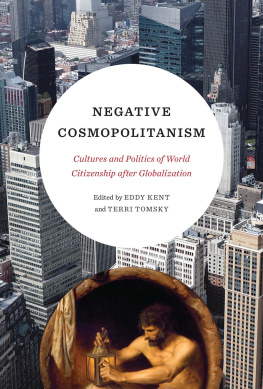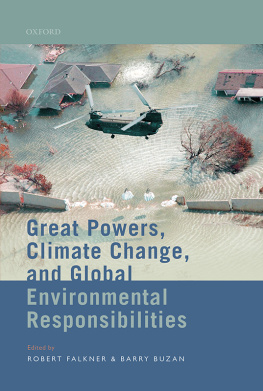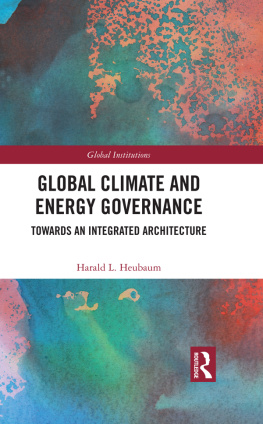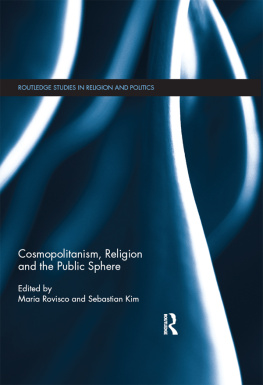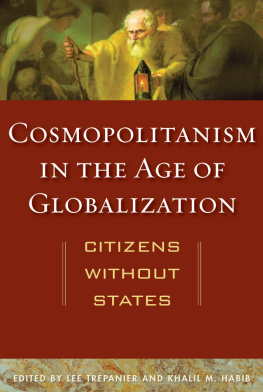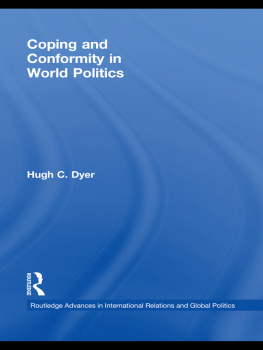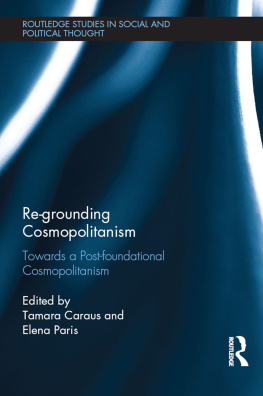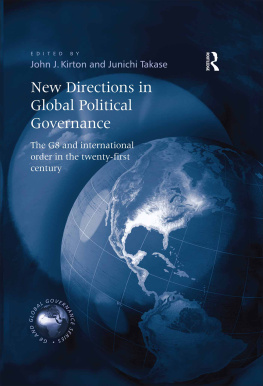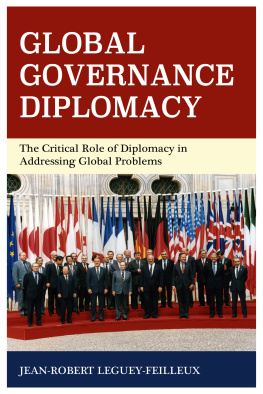
Negative Cosmopolitanism
NEGATIVE COSMOPOLITANISM
Cultures and Politics of World Citizenship after Globalization
Edited by EDDY KENT
and TERRI TOMSKY
McGill-Queens University Press
Montreal & Kingston London Chicago
McGill-Queens University Press 2017
American Good Life, the Bandung Spirit, and a Human Rights Record by Crystal Parikh also appears in Writing Human Rights: The Political Imaginaries of Writers of Color (University of Minnesota Press, 2017) The Regents of University of Minnesota
ISBN 978-0-7735-5096-4 (cloth)
ISBN 978-0-7735-5097-1 (paper)
ISBN 978-0-7735-5204-3 (ePDF)
ISBN 978-0-7735-5205-0 (ePUB)
Legal deposit fourth quarter 2017
Bibliothque nationale du Qubec
Printed in Canada on acid-free paper that is 100% ancient forest free (100% post-consumer recycled), processed chlorine free
McGill-Queens University Press acknowledges the support of the Canada Council for the Arts for our publishing program. We also acknowledge the financial support of the Government of Canada through the Canada Book Fund for our publishing activities.
Library and Archives Canada Cataloguing in Publication
Negative cosmopolitanism : cultures and politics of world citizenship after globalization / edited by Eddy Kent and Terri Tomsky.
Includes bibliographical references and index.
Issued in print and electronic formats.
ISBN 978-0-7735-5096-4 (cloth). ISBN 978-0-7735-5097-1 (paper). ISBN 978-0-7735-5204-3 (ePDF). ISBN 978-0-7735-5205-0 (ePUB)
1. Cosmopolitanism History. 2. Globalization History. 3. Capitalism History. 4. Cosmopolitanism in literature. 5. Globalization in literature. 6. Capitalism in literature. I. Kent, Eddy, 1978, editor II. Tomsky, Terri, 1975, editor
JZ1308.N44 2017306C2017-904047-2
C2017-904048-0
Set in 10.5/13.5 Warnock Pro with Newslab
Book design & typesetting by Garet Markvoort, zijn digital
CONTENTS
EDDY KENT AND TERRI TOMSKY
CRYSTAL PARIKH
GEORDIE MILLER
DENNIS MISCHKE
SNEJA GUNEW
LIAM OLOUGHLIN
PAUL UGOR
PAMELA McCALLUM
MELISSA STEPHENS
HEATHER LATIMER
JULIANE COLLARD
MIKE DILLON
DINA GUSEJNOVA
MARK SIMPSON
TIMOTHY BRENNAN
PETER NYERS
ACKNOWLEDGMENTS
The essays in this collection emerge from papers presented at a conference on the topic of negative cosmopolitanism, held in October 2012. That conference was made possible through the support of the Social Sciences and Humanities Research Council of Canada, the Alexander von Humboldt Foundation, the Trudeau Foundation, the Art Gallery of Alberta, and the University of Alberta. The stimulating and often contentious conversations held during those two days, among over fifty presenters and hundreds of registered attendees, convinced us of the need for this volume. We thank the contributors for their patience in seeing this book through to its publication. It has been a long journey!
On behalf of all the contributors, we would like to thank all of the people whose eyes have passed over various parts of this manuscript during its composition. In particular, we owe a debt of gratitude to Mark Abley, our editor at McGill-Queens University Press, who scrupulously stuck by the project and supported us all the way. We would also like to thank the presss three anonymous readers for the seriousness and care that they took in reviewing the manuscript. We particularly appreciate the constructive feedback and detailed specificity of each report, which helped shape this final volume.
Assembling an edited collection, we have learned, is a complicated process and we would like to acknowledge our research assistants, Liam Young and Kristina Vyskocil. Liam was our proverbial cat-herder, overseeing the formatting of each essay into the MQUP style; Kristina joined the project at a later stage, reviewing the manuscript and scouring the footnotes to ensure the integrity of our works cited. We are very grateful for their work and any errors that might remain are wholly our responsibility. We are also grateful to the Faculty of Arts at the University of Alberta who, through the Roger Smith Undergraduate Research Award, enabled John Yoon to join our project and help develop a preliminary bibliography as we began writing our introduction to the collection.
During the project, we have relied on our community of colleagues, students, and support staff at the University of Alberta. We gratefully acknowledge the Kule Institute of Advanced Study, whose generous Research Cluster Grant helped fund our two research assistants. Thanks, too, are extended to Susan Howard, the research administrator in the Department of English and Film Studies. Sues experience helped us navigate the sometimes byzantine internal and external financial reporting systems as well as various logistical challenges that came with the development of this collection. Our colleagues here in Edmonton have been relentless in their encouragement for this project but a special mention must go to Imre Szeman, Canada Research Chair in Cultural Studies, who has served as our mentor, right from the moment we began thinking about organizing the conference. Imre has been a constant source of knowledge and friendship to us: this book would not exist without his support.
A version of Sneja Gunews chapter, Fractured Mediations: Eur/Asian Vernacular Cosmopolitanisms, first appeared in her monograph, Post-Multicultural Writers as Neo-cosmopolitan Mediators, published by Anthem Press in 2017. It is reprinted here by kind permission of Anthem Press. A version of Mike Dillons chapter, Internal Racisms of the Yakuza-eiga, appeared in Studies in the Humanities 39, no. 12 (2012): 193232, as The Immigrant and the Yakuza: Gangscapes in Miike Takashis DOA. It is published here by kind permission of the journal. A version of Crystal Parikhs chapter, American Good Life, the Bandung Spirit, and a Human Rights Record, also appears in her 2017 monograph, Writing Human Rights: The Political Imaginaries of Writers of Color, published by the University of Minnesota Press at the same time as this volume.
Finally, as co-editors, each of us has a network of friends and distant family who have supported us through this and all our other academic endeavours. However, we are especially thankful for the child-care professionals at Edmontons University Infant Toddler Centre, who took care of our children, Felix and Zara, and whose labour was indispensable to freeing up the time needed to work on a book of this scope.
Negative Cosmopolitanism
Introduction: Negative Cosmopolitanism
Eddy Kent and Terri Tomsky
Cosmopolitanism, like most -isms, is open to a variety of interpretations. For many, cosmopolitanism is an ancient Greek concept that has been rediscovered by modern thinkers trying to develop conceptual tools capable of managing our shrinking globe. A byword for world citizenship, it is frequently associated with progressive and emancipatory politics. For others, cosmopolitanism is an epithet, as in the anti-Semitic rhetoric of the rootless Jew or the anti-capitalist campaigns against the Davos set and the global one percent.
Negative Cosmopolitanism is not designed to reconcile the debate, in the sense of deciding whether indeed cosmopolitanism is good or bad. Instead, this book sets out to understand cosmopolitanism within the context of globalization. Even cosmopolitanisms great champions, such as political scientist Anthony Pagden, agree that cosmopolitanism is hopelessly entangled with globalization, with cosmopolitan ideals frequently used both to promote and excuse the exploitation and violence of imperialist and capitalist expansion.cosmopolitanized, whether we like it or not. In other words, we need to understand cosmopolitanism not just as a philosophical ideal, but also as a material fact.
Next page
